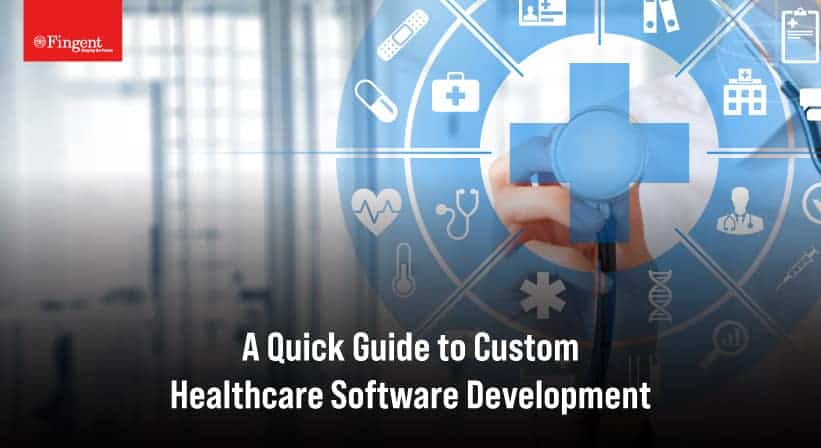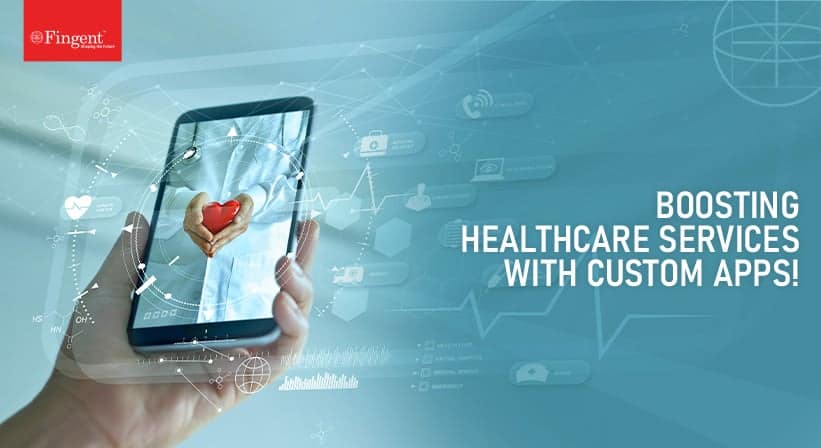5 Healthcare Digitalization Trends Crucial In 2021 And Beyond
Top Healthcare Digitalization Trends To Look For In The New Normal
Healthcare digitalization is reshaping the way we interact with healthcare professionals, share medical data or make decisions related to treatment and outcomes. There are plenty of examples that substantiate the digitalization of healthcare today, such as Artificial Intelligence-powered medical devices, telemedicine, blockchain, remote-patient monitoring, and electronic health records.
The main aim of healthcare innovation is to streamline the medical professionals’ work, optimize medical software systems, reduce human errors, improve patient outcomes, and lower costs through integrated web and mobile experiences.
Read more: The Application and Impact of Information Technology in Healthcare
Let’s look at the state of healthcare digitalization in 2021 and beyond:
1. On-demand Healthcare Will Grow
With the COVID-19 pandemic restricting many people to remain indoors, more and more patients seek on-demand healthcare. It is convenient as it helps patients seek guidance at their own time and from anywhere they need it.
DMN3 reveals that patients obtain online medical information primarily for the following reasons:
- 77% for booking medical appointments
- 47% for searching information about doctors and healthcare professionals
- 38% for searching information about hospitals and medical facilities
That said, on-demand healthcare is rising due to the growth of the gig economy. Here, freelance professionals from various industries hire themselves out per job or ‘gig’ instead of sticking to one company.
Read more: Patient Engagement Platforms: 7 Must-have Features
Many online healthcare marketplaces link doctors directly with short-term tasks, making it easier for physicians to deliver patient care in specific circumstances based on their expertise and schedule. Simply put, doctors are becoming on-demand healthcare providers to meet the changing needs of their patients in a better way.
2. Big Data Will Be Used To Improve Healthcare Management
Big data is the information gathered from various platforms such as eCommerce, social media, online transactions, and financial transactions. It helps identify patterns and trends for future use.
Read more: 5 Ways Big Data is Changing the Healthcare Industry
For healthcare, big data offers benefits such as:
- Reduced medication errors: Patient record analysis allows the healthcare software to flag any inconsistencies between a patient’s health and drug prescriptions. This alerts the health professionals and patients in case there is a potential risk of a medication error.
- Simplifying preventive care: Many recurring patients stepping into emergency rooms are “frequent flyers.” These frequent flyers account for up to 28% of clinical visits. Big data analysis helps identify these recurring patients and create preventive plans to keep them from returning.
- Improved staffing: Using big data’s predictive analysis, hospitals and clinics can estimate future admission rates enabling these facilities to allocate proper staff to deal with the patient. This will help save money and reduce emergency room waiting time, especially when a facility is understaffed.
Case Study: How did a data analytics solution help NHS gain financial, clinical, and geographical insights to improve visibility over their KPIs? Read Now!
Big data analytics, visualization, and insights generation can improve healthcare operations management and transform the patient experience.
3. Virtual Reality Will Transform Medical Training & Care Delivery Models
Virtual Reality is one of the most outstanding healthcare digitalization trends that change the way patients are diagnosed, and medical residents are trained.
- VR in medical diagnosis & treatments: VR is increasingly used in treatment segments in healthcare, such as patient education, robotic surgery, physical and psychological therapy, etc. For instance, medical professionals can use VR to construct a 360° patient-specific video detailing how the surgery will help the patient cure and the consequent results. Virtual Reality has been found effective in treating anxiety, post-traumatic stress disorder, and stroke.
Case Study: Find how Fingent developed a unique mixed reality application for a leading university that enables users to identify people using facial recognition. Download Now!
- VR for medical training: Other uses of VR technology include doctors and medical residents using VR simulations to hone their skills (learning in near-real situations) and safely plan complicated surgeries. In addition, VR headsets are used post-surgery to encourage patients to exercise and follow physiotherapies. The technology also enables autistic children to learn and navigate the world.
- Growth of VR in the medical field: From startups to established pharma companies, everyone recognizes the role of VR in healthcare. Experts estimate that by 2025 the global virtual and augmented reality in healthcare will reach $5.1 billion market value. So, if you’re a healthcare company wanting to improve your digital marketing strategy, you should consider investing in VR.
Read more: How Virtual Reality Improves The Standards Of Medical Education And Training
Virtual Reality technology offers a powerful communication channel that allows you to understand customers’ needs better and virtually engage them with your products and services.
4. Wearable Medical Devices Will Enjoy A Wider Market
Another major healthcare digitalization trend is companies collecting their health data from medical devices such as wearables. Previously, most people would check in with their doctors only when something went wrong and were used to undergoing physical check-ups once a year. However, technology is changing that. Today, people highly focus on preventive maintenance and are interested in knowing about their health status frequently. This trend forces several healthcare companies to invest in wearable technology devices that allow patients or family members to track health vitals and seek medical aid when needed. Wearable medical devices enable up-to-date monitoring of high-risk patients and determine the likelihood of any severe health risk.
Experts estimate that the wearable medical device market value will cross USD 27,200 mn by 2023.
Following are some of the widely used wearable devices:
- Exercise trackers (Google Fit, Fitbit, etc.)
- Heart rate sensors (Samsung Heart Rate Sensor, Pulse Sensor, etc.)
- Sweat meters: to monitor blood sugar levels of diabetics
- Oximeters: to monitor the amount of oxygen carried in the blood
Wearable devices in healthcare offer the following benefits:
- Personalized healthcare experience: Medical devices help patients improve their health and give them a sense of ownership regarding personal healthcare management.
- Insurance pricing: Wearable devices provide insurers with insights that enable them to rate a patient’s risk for illness more accurately.
- Insurance incentives: Wearable devices allow patients to take preventive measures to improve their health. Such patients are more likely to obtain lower insurance premiums.
- Gamification opportunities: Fitness watches can help create competitive goals for users to achieve through diet, nutrition, and exercise.
Case Study: Read more about how Fingent helped create a fitness Regimen app for trainers.
5. Healthcare AI Investments Will Increase
By 2025, the healthcare AI-enabled tools market is expected to exceed $34 billion globally. This indicates that healthcare AI investments will peak soon as Artificial Intelligence is set to transform various segments in medicine.
AI-powered chatbots and virtual health assistants fulfill many roles in the healthcare industry, such as customer service representatives, diagnostic tools, or even therapists. Hence AI in healthcare is gaining immense popularity. According to a report published by MarketsandMarkets, the global healthcare chatbots market is estimated to reach $314.3 million by 2023.
Read more: 5 Leading Chatbot Use Cases Explained with Real-life Examples
That said, we can witness the real power of AI in diverse areas such as medical imaging, drug discovery, precision medicine, and genomics. For example, the first-ever drug designed by AI is showing some promise to help patients suffering from obsessive-compulsive disorder. The AI-made drug molecule, DSP-1181, is in clinical trials currently. Researchers and scientists expect that the use of AI will make drug development faster and more efficient.
Overall, AI is projected to bring USD 150 billion by 2026 in annual savings for the US healthcare economy. As start-ups are lapping up the opportunity, the number of active AI start-ups has increased 14 times since 2000.
Why Keep A Close Eye On These Healthcare Digitalization Trends
These five healthcare digitalization trends will spill over in the future as the industry will innovate and adapt to meet the patients’ demands. As a result, organizations that embrace healthcare digitalization will see dividends sooner.
Fingent helps you navigate the digital healthcare space and adapt to the ‘Next Normal’ with our transformative experiences. Our custom healthcare software solutions have helped many of the leading healthcare providers worldwide. Contact us to learn more about how your healthcare organization or clinic can leverage healthcare digitalization effectively.
Stay up to date on what's new

Recommended Posts

20 Jun 2024 Healthcare B2B
AI in Healthcare: Enhancing Patient Outcomes and Experience
Artificial Intelligence is a multi-talented assistant and has proven its worth in the healthcare industry. Healthcare organizations have found innumerable ways to use AI, from record maintenance to patient assistance.……

22 Jun 2023 Healthcare B2B
Custom Healthcare Software Development – Ultimate Guide!
The world of technology keeps evolving and waits for no one, so it is our responsibility to keep up with it rather than fall behind. The healthcare industry has for……

16 Feb 2022 Healthcare
Is Digital Twin Promising A New Era for Healthcare?
Over the next three years, 66% of healthcare executives are planning to increase their investment in digital twin, states a recent digital health technology report. Since the outbreak of the……

10 Feb 2022 Healthcare B2B
How Can Custom-Made Software Provide Superior Customer Service In The Healthcare Industry?
Healthcare is a vast customer service industry that is trying to improve patient health and healthcare processes. This patient-centric approach has evolved, especially after the COVID-19 pandemic. Virtual consultations and……
Featured Blogs
Stay up to date on
what's new

















